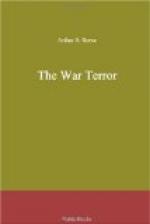“And Edith Atherton?”
“The same way. They both carry it. I won’t go into the Mendelian law on the subject. We are clearing up much that is obscure. But as to Burroughs, he should marry, if at all, some one without that particular taint. I believe that in a few generations by proper mating most taints might be bred out of families.”
Maude Schofield evidently did not agree with Dr. Crafts on some point, and, noticing it, he seemed to be in the position both of explaining his contention to us and of defending it before his fair assistant.
“It is my opinion, as far as I have gone with the data,” he added, “that there is hope for many of those whose family history shows certain nervous taints. A sweeping prohibition of such marriages would be futile, perhaps injurious. It is necessary that the mating be carefully made, however, to prevent intensifying the taint. You see, though I am a eugenist I am not an extremist.”
He paused, then resumed argumentatively: “Then there are other questions, too, like that of genius with its close relation to manic depressive insanity. Also, there is decrease enough in the birth rate, without adding an excuse for it. No, that a young man like Atherton should take the subject seriously, instead of spending his time in wild dissipation, like his father, is certainly creditable, argues in itself that there still must exist some strength in his stock.
“And, of course,” he continued warmly, “when I say that weakness in a trait—not in all traits, by any means—should marry strength and that strength may marry weakness, I don’t mean that all matches should be like that. If we are too strict we may prohibit practically all marriages. In Atherton’s case, as in many another, I felt that I should interpret the rule as sanely as possible.”
“Strength should marry strength, and weakness should never marry,” persisted Maude Schofield. “Nothing short of that will satisfy the true eugenist.”
“Theoretically,” objected Crafts. “But Atherton was going to marry, anyhow. The only thing for me to do was to lay down a rule which he might follow safely. Besides, any other rule meant sure disaster.”
“It was the only rule with half a chance of being followed and at any rate,” drawled Kennedy, as the eugenists wrangled, “what difference does it make in this case? As nearly as I can make out it is Mrs. Atherton herself, not Atherton, who is ill.”
Maude Schofield had risen to return to supervising a clerk who needed help. She left us, still unconvinced.
“That is a very clever girl,” remarked Kennedy as she shut the door and he scanned Dr. Crafts’ face dosely.
“Very,” assented the Doctor.
“The Schofields come of good stock?” hazarded Kennedy.
“Very,” assented Dr. Crafts again.
Evidently he did not care to talk about individual cases, and I felt that the rule was a safe one, to prevent Eugenics from becoming Gossip. Kennedy thanked him for his courtesy, and we left apparently on the best of terms both with Crafts and his assistant.




